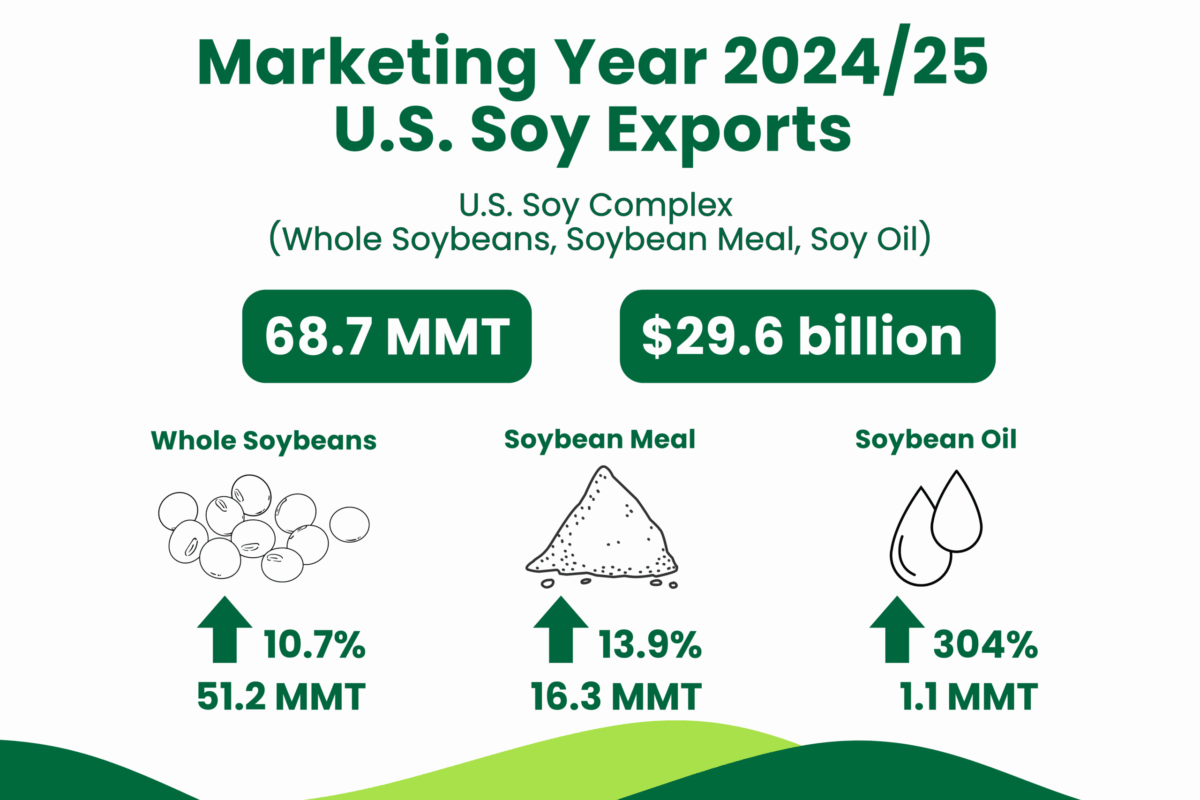Companies Share Success Switching to Soy

With the support of U.S. soybean farmers through their soy checkoff, critical research has inspired manufacturers in wide-ranging industries to make the switch from petroleum to soybean oil.
Now that this renewable, plant-based alternative is proven in multiple applications, it can pave the way for further innovation, leading to greater demand and increased sales for U.S. soybean growers — a win all around.
Meet the minds behind the switch from petroleum to soybean oil in three different use cases below:
“The perfect material” for lubricants
Replacing petroleum with soybean oil has multiple benefits for lubricants such as motor oil, hydraulic fluids, and greases. With soy checkoff support, researchers at Biosynthetic Technologies have found success using high oleic soybean oil in motor oil.
“We’re willing to look at all of the fatty acids, but when it comes down to where we need to be, particularly with some of the products that we’ve been pushing forward now, we find that oleic acid as derived from high oleic soybean oils are the perfect application, the perfect material to create some products,” says Mark Miller, CEO of Biosynthetic Technologies.
Watch the full interview with Miller below.
Soybean oil — compared to petroleum in conventional motor oil — is less costly to produce. It also helps meet sustainability and performance goals. In addition, testing has shown soy-based motor oils work in high-temperature automotive and other industrial uses and can lead to both better fuel efficiency and cleaner engines.
Plus, using soy in motor oil doesn’t sacrifice performance. Consumers get top-quality products while demand for U.S. soybeans grows.
“Unique functionality” in asphalt
Often, asphalt manufacturers use a synthetic polymer, styrene-butadiene-styrene (SBS), as a binding agent, but recent research found a more effective option: high oleic soybean oil. A biobased polymer with soybean oil is cleaner, more cost-effective and higher-performing than traditional asphalt binders.
“All of the new functionality that molecules like soy bring to the table, we’ve never thought about how those could add not only performance that matches what you’re using today but add something that your product couldn’t do before. That’s enabled by the unique functionality that biobased materials give you,” says Eric Cochran, a researcher from Iowa State University.
Watch the full interview with Cochran below.
Researchers at Iowa State University, along with the Iowa Soybean Association and the Asphalt Paving Association of Iowa, partnered with the soy checkoff to dive into the mechanics of replacing SBS polymers with high oleic soybean oil, and the results were extremely positive.
While the materials have similarities, soybean oil provides several benefits SBS polymers just can’t match. Using soy:
- Saves on both energy and cost.
- Has environmental benefits.
- Provides avenues for other uses.
Not only does replacing SBS with soy in asphalt create a new revenue stream for soy growers now, but the doors this research opens for other potential uses can help keep the soy industry in high demand for years to come.
“A performance benefit” for tires
Tires go through rigorous testing to ensure they’re ready for the road, and manufacturers are always looking for new ways to make tire technology better — including the component ingredients they use. In an effort to develop a sustainable, high-quality tire, the pros at Goodyear Tire and Rubber Company began collaborating with the soy checkoff nearly a decade ago to develop a soybean-based rubber to replace conventional petroleum-based rubber.
The result: a high-performing, weather-ready, more durable product. Goodyear’s soy-based tire lines stand up to changing temperatures and various terrains with ease, and they’ve created a sustainable tire without sacrificing quality.
“The fact that it (soybean oil) brought a performance benefit that we couldn’t get without it, that’s what got it into its first product. Each year over the last four years, there’s been a new product containing soybean oil and I expect that to continue into the future,” says Bob Woloszynek, Goodyear’s chief engineer.
Watch the full interview with Woloszynek below.
An added benefit to using soybean oil in tire rubber is customer satisfaction. Many consumers are looking for eco-friendly, sustainable options, and soy helps Goodyear deliver. Woloszynek says they’ve seen an uptick in sales for their bio-friendly tires, proving there is demand for similar products. Their successful partnership with the checkoff could lead to other brands looking for innovative ways to use soy in similar technology and build more demand for soy.
“Now as time has gone on, we have a huge sustainability initiative,” says Woloszynek. “We’re being very aggressive within the industry by promoting our sustainable technologies and trying to increase the use of sustainable technologies.”
Goodyear plans to phase out petroleum-derived oils from its products by 2040 and has inspired other companies, like Skechers, to take advantage of soybean oil.
“We get pretty excited about what our beans can do and where they end up — particularly when it fills a market need and brings profit opportunities to farmers across the country,” says Gregg Fujan, a former checkoff farmer-leader who grows soybeans in Nebraska. “Our checkoff works hard to provide opportunities for innovation through building strategic partnerships, funding innovative research and more to drive demand and preference for U.S. soybeans.”
From lubricants to asphalt to tires, countless industries are realizing the benefits of replacing petrochemicals with plant-based soybean oil. Soybean oil allows manufacturers to create quality products and meet the growing needs of consumers looking for sustainable, environmentally friendly goods.



